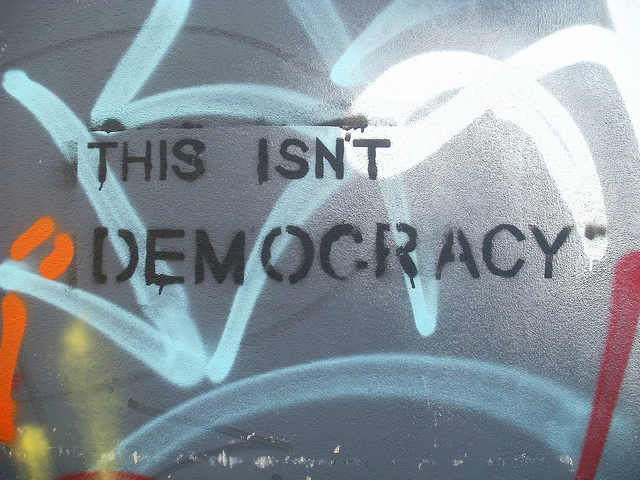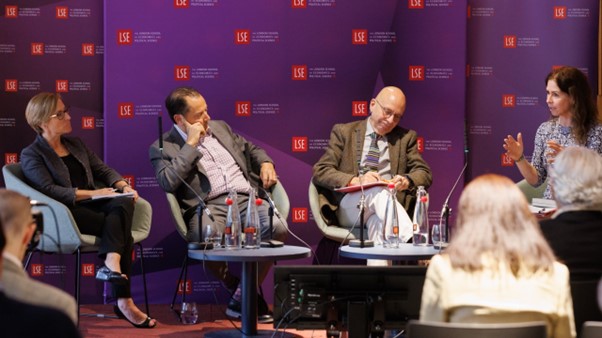 As dividends paid to shareholders reach a new record, average wages for ordinary citizens continue to suffer. Bart Cammaerts argues that the outlandish wages paid to executives in the private as well as public sector are to the detriment of incomes of the vast majority of people who work for a living or are dependent on welfare. What this signifies is that the core-promises intrinsic to democracy are in decline or repressed. It is time for the marriage between democracy and capitalism to end.
As dividends paid to shareholders reach a new record, average wages for ordinary citizens continue to suffer. Bart Cammaerts argues that the outlandish wages paid to executives in the private as well as public sector are to the detriment of incomes of the vast majority of people who work for a living or are dependent on welfare. What this signifies is that the core-promises intrinsic to democracy are in decline or repressed. It is time for the marriage between democracy and capitalism to end.
A new world record was set last year, for the first time in history the worldwide total of dividends paid out to shareholders surpassed the 1 trillion $ mark. In the UK, payouts of dividends grew by a whopping 39% from 2009 to 2013 (and by 49% in the U.S.). The CEO of Henderson, the investment company responsible for this research, called this ‘a huge milestone for equity investors’ and unsurprisingly The Spectator spoke of ‘a milestone worth celebrating’.
I beg to differ with these ‘celebratory’ claims and call this a sad and shameful milestone. Why? Over the same period of time in the UK – i.e. from 2009 to 2013 – average wages for ordinary citizens (thus excluding bonuses) rose by about 1-2% annually while inflation was rampant at about 3-5% per year. Furthermore, poverty has risen sharply in that period. A 2013 report published by the Social Mobility and Child Poverty Commission concluded that poverty has not only risen in recent years, but that that there are 5 million adults and children in the UK that are living in working poor households. In other words, in real terms ordinary people working for a living, as well as those on benefits, have been going backwards whilst owners of capital and investors have been doing very well indeed, thank you very much.
Another economic elite that has also been doing excessively well is management and especially company executives. In 2013, the Economic Policy Institute calculated that CEO-pay rose by about 875% over the period 1978 to 2012, while that of workers grew by a meager 5.4% over that same period of over 30 years. In 2012, CEO earnings were on average over 200 times higher than those of a typical worker. How is all this morally justified?

Arguably, these astronomical payouts to investors in combination with the outlandish wages paid to executives in the private as well as public sector are to the detriment of incomes of the vast majority of people who work for a living or are dependent on welfare. What this also illustrates is that the 2008 near-collapse of the capitalist system and the subsequent bailout of banks and capital owners by taxpayers have served to orchestrate a frontal attack on the interests of these taxpaying people which has resulted in a dramatic increase in inequality. This went hand in hand with a vilification of the poor and the disadvantaged in society who are increasingly blamed for their own predicament and left to their own devises. At the same time, the investors and CEOs are precisely those who tend to contribute least to the society in which they make their profit, they are precisely the kind of actors that aim and succeed in not paying taxes by exploiting so-called loopholes or using tax havens to ‘park’ their wealth.
All this is, as Stiglitz also points out, “not inevitable” and above all we need to acknowledge that this ever-growing inequality is the result of political choices, not merely of market forces; “markets are shaped by politics […] politics is shaped by money”, Stiglitz states. This brings up serious questions regarding the nature and role of liberal representative democracy in this, not only in the US, but also here in the UK. A recent audit of democracy in the UK concluded that “representative democracy is in long-term, terminal decline” and “the power which large corporations and wealthy individuals now wield on the UK political system is unprecedented”. It is telling in this regard that Domhoff’s most recent seventh edition of his famous book Who Rules America? received the worrying subtitle: The Triumph of the Corporate Rich.
In recent decades democracy has not perfected itself, as implied by Derrida’s democracy to come, on the contrary. It could be argued that many of the core-promises intrinsic to democracy, such as promoting and extending citizen participation and equality, a system of citizen control from below geared towards protecting citizen interests and the collective good, and the civic freedoms to dissent and to contest, enabling renewal, have not materialized at all, are in decline or repressed. We are not born anymore for that which is better, to paraphrase the German poet Friedrich Schiller. It doesn’t have to be like this, however. Maybe the time has come to deterritorialize the democratic imaginary from the market/capitalist imaginary. As Žižek proclaimed at Occupy Wall Street in Zuccoti Park (10/10/2011) “The marriage between democracy and capitalism is over”. If genuine change is to become a real possibility and these unbearable inequalities tackled this divorce needs to be settled sooner rather than later.
This article originally appeared at the LSE’s British Politics and Policy blog.
Note: This article gives the views of the authors, and not the position of USApp– American Politics and Policy, nor of the London School of Economics.
Shortened URL for this post: http://bit.ly/1hPzq5a
_________________________________
Bart Cammaerts – LSE Media and Communications
Bart Cammaerts is Associate Professor Director of PhD Programme in the Media and Communications Department at the London School of Economics.






